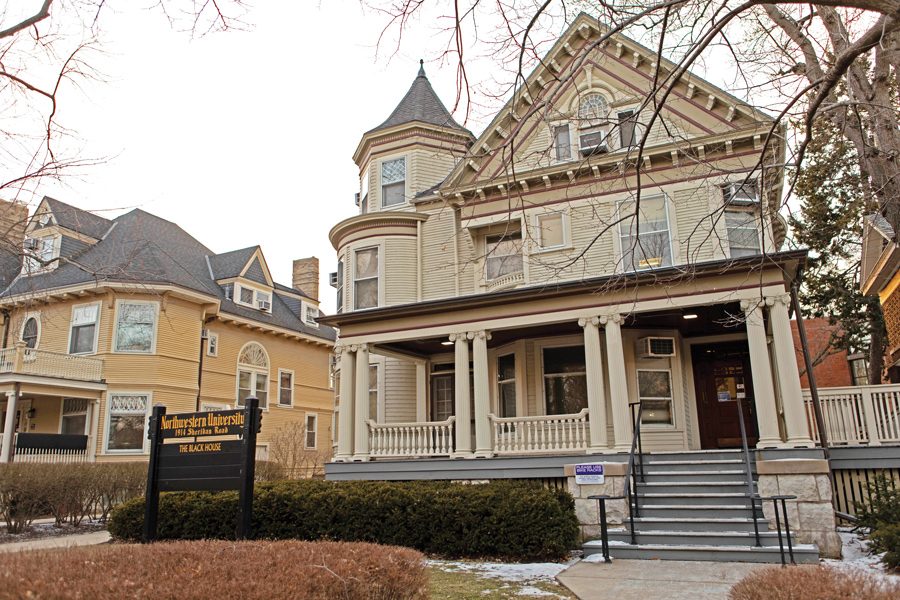Black History Month features intersectional dialogues
Daily file photo by Katie Pach
The original location of the Black House, on 1914 Sheridan Road. The Multicultural Student Affairs hosts intersectional dialogues as a part of Black History Month.
February 16, 2020
This year’s “All Black Everything”-themed Black History Month programming included events with other identity-based communities to explore the intersections within the black community.
The programming was handled by a committee within Multicultural Student Affairs, led by Alyscia Raines, an assistant director.
“We want to see what blackness looks like on a large-scale, on a small scale, on a nuanced scale because blackness — it’s beautiful and it’s rich and it’s also complicated,” Raines said.
Raines, who coordinated BHM alongside a committee of MSA staff members, said this month’s events helped give spaces to individuals that hold biracial and multiracial identities. She acknowledged the challenges of intersectional programming but said Multicultural Student Affairs was committed to “not isolating” individuals when drafting programs.
Ahlaam Delange, a Medill fifth-year who identifies as Desi and black, said she feels the programming came from other identity-based communities taking steps to acknowledge their intersections with the black community.
Delange, a former Daily staffer, said the model minority myth,” the concept that Asian-Americans are the most successful minority demographic, was a cause for anti-black sentiments in Asian Pacific Islander Desi American communities. For her, talking through these topics during the BHM x SolidariTea: Intersections of Black and APIDA communities helped make her feel safe and acknowledged.
“Deconstructing anti-blackness helps (other communities) deconstruct their own experience and how they may be contributing to systems of oppression that are also hurting them,” Delange said. “It doesn’t serve anyone to be a model minority.”
For SESP first-year Charlotte Wong, these events are spaces of self-reflection. Wong frequently attends SolidariTea, a regular APIDA discussion group run by MSA, and attended the Black x APIDA crossover event.
Wong, who grew up in Hong Kong, said such programming gives her glimpses into lives that are different from hers. For her, intersectional programming is a way to connect her academic knowledge to the real-life experiences of others and reach a better understanding.
“It’s a space where people share their experiences and from those experiences you see connections,” Wong said. “And you see differences, even though there are connections.”
Black History Month also included a community night for black and queer conversation.
Gabriel Guzmán, a graduate assistant at MSA who works with the LGBTQ population, said the event focused on allyship in the black community and discussed black and queer intersectionality.
“In the black community, there are a lot of different issues that pertain to masculinity, black masculinity and the stigma that exists in general about being overly flamboyant, overly femme,” Guzmán said.
Multicultural Student Affairs also hosted a crossover event with Harvest, a series for Native and Indigenous communities on campus. The event focused on ancestry and storytelling, inviting participants to close their eyes and imagine an ancestor and associated memories before engaging in storytelling and dialogue.
This programming is only “step one” into thinking about how Multicultural Student Affairs undertakes cross-cultural and intersectional programming, Raines said. For her, it is important to honor the multiple identities that the student population holds.
Guzmán said the mission statement of Multicultural Student Affairs is constantly evolving as new staff members join the team and give insights into their aspirations for the organization.
“This whole year has been us moving towards a more intersectional, collaborative approach,” said Guzmán. “It’s something that we’re still working on in terms of programming.”
Email: [email protected]
Twitter: @anushuyathapa
Related Stories:
– Multicultural Student Affairs hosts BHM kickoff
– Daviree Velázquez Phillip to join Northwestern MSA


